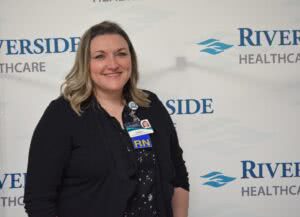Sexual Assault Awareness: Myths, Specialized Care, and Community Resources

Sexual assault affects millions of Americans. Yet, it remains one of the most underreported crimes. Deanna Booker, Sexual Assault Nurse Examiner (SANE) Program Coordinator at Riverside Healthcare, says bringing awareness about sexual assault is critical for instilling change.
“We want to empower people who have been assaulted to come forward and get the medical care and counseling they need and deserve.”
Myth vs. Fact
Unfortunately, myths surrounding sexual assault often prevent people from reporting the assault or seeking help. For example, some people believe that a husband or wife cannot rape their spouse or sexually assault them. The truth is, sexual assault occurs anytime someone is forced or coerced to engage in a sexual activity they do not consent to.
Another common myth is that men can’t be raped, which is false. About 92,000 men are raped each year in the United States.
Society has also propagated the idea that many survivors “false report,” meaning they allege assault when it did not happen. This is largely inaccurate. Only about 4-8% of all reports are found false. “So, with that being said, over 90% of sexual assaults that are reported are true,” states Booker.
Benefits of a Trauma-Informed Approach
Due to all the misinformation, many survivors feel embarrassed about their assault. They often feel they might be blamed or be “responsible” in some way. Or, that authorities—or even emergency room or other medical staff—won’t believe them.
“As a sexual assault nurse, we have special training on employing a trauma-informed approach, including to always believe our patient. If someone is coming forward with such a significant trauma in their life, and they’re telling a complete stranger that this happened, this is truth,” assures Booker.
An additional obstacle to seeking help is potential retaliation. However, the state protects survivors in this regard. They do not have to disclose their name to anyone besides to the healthcare provider.
“Survivors can come to the emergency department and receive full care—and they will not even have an expense out of pocket. They can have evidence collected and get full treatment without disclosing who they are. That’s something our state developed a couple of years ago and is very impactful to the survivor,” explains Booker.
SANE-Certified Care
When the SANE program was established in 2017, Riverside began encouraging nurses to go through training in order to understand how to care for a patient in a trauma-informed manner. Every healthcare provider in the emergency room has a training that was created specifically for sexual assault. SANE-certified registered nurses (RNs) are trained in forensic evidence collection, as well as all of the other guidelines that accompany the care of a sexual assault patient.
“This is a special patient, and we need to take that into consideration,” notes Booker. “Something else our hospital supports is the SANE coordinator position. I have communications and relationships throughout our community, so I can provide resources to the patient in order to help them after they leave our emergency department.”
Such resources include the Clove Alliance, an advocacy and counseling center. The Child Advocacy Center specializes in helping children who have been sexually or physically abused. Harbor House assists in domestic violence and intimate partner violence.
Survivors Need Your Support
Not every survivor is ready to receive help, which is a normal response. Booker wants these individuals to understand that they will never be forced to do anything.
“We would never make anyone get treatment or report [the assault]. It’s on their timeline. When they’re ready and they feel they can do it, we say, ‘I will be there for you. I believe you. I support you.’ The reason this crime and this situation is so underreported is because people feel they will not be believed. If you know someone or someone tells you that they’re assaulted, the number-one thing you can do is to believe them, support them, and tell them that if they ever need you, you’ll be there.”
**To listen to an in-depth conversation on this topic with Deanna Booker, Sexual Assault Nurse Examiner (SANE) Program Coordinator at Riverside Healthcare, visit: Sexual Assault Awareness Podcast
